Collinss
I know how frustrating it can get with all those assignment deadlines and Impeding examinations! Nursing Being my main profession line, I have essential guides that are A graded and that have helped me a lot.
I am a super friendly person and you can message me for any assistance whatsoever.
We have to have each other's backs.
- 609
- 0
- 13
Community
- Followers
- Following
622 items

Microbiology Lab Exam 6 Questions with Complete Solutions rated A+
Microbiology Lab Exam 6 Questions with Complete Solutions rated A+ How are thermal death point and thermal death time different? - Thermal death point is the lowest temperature that kills all cells in a broth in 10 minutes. Thermal death time is the time required to completely sterilize a particular volume of liquid at a given temperature. Is moist heat more effective than dry heat? - Because of its ability to penetrate microbial cells, moist heat kills microogranisms by denaturing the...
- Exam (elaborations)
- • 9 pages •
Microbiology Lab Exam 6 Questions with Complete Solutions rated A+ How are thermal death point and thermal death time different? - Thermal death point is the lowest temperature that kills all cells in a broth in 10 minutes. Thermal death time is the time required to completely sterilize a particular volume of liquid at a given temperature. Is moist heat more effective than dry heat? - Because of its ability to penetrate microbial cells, moist heat kills microogranisms by denaturing the...
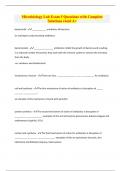
Microbiology Lab Exam 5 Questions with Complete Solutions rated A+
Microbiology Lab Exam 5 Questions with Complete Solutions rated A+ bactericidal - ____________ antibiotics kill bacteria. Ex: antiseptics and prescribed antibiotics bacteriostatic - ________________ antibiotics inhibit the growth of bacteria and resulting in a reduced number of bacteria; they work with the immune system to remove the microbes from the body. -ex: sanitizers and disinfectants mechanisms of action - There are four ________________ ____ __________ for antibiotics. cell ...
- Exam (elaborations)
- • 7 pages •
Microbiology Lab Exam 5 Questions with Complete Solutions rated A+ bactericidal - ____________ antibiotics kill bacteria. Ex: antiseptics and prescribed antibiotics bacteriostatic - ________________ antibiotics inhibit the growth of bacteria and resulting in a reduced number of bacteria; they work with the immune system to remove the microbes from the body. -ex: sanitizers and disinfectants mechanisms of action - There are four ________________ ____ __________ for antibiotics. cell ...
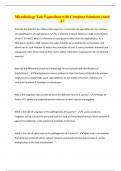
Microbiology Lab 9 questions with Complete Solutions rated A+
Microbiology Lab 9 questions with Complete Solutions rated A+ Describe the selective and differential properties of mannitol salt agar (MSA) for the isolation and identification of staphylococci. - As a selective medium, MSA has a high concentration of salt (7.5% NaCl), which is inhibitory to most bacteria other than the staphylococci. As a differential medium, MSA contains the sugar mannitol as a substrate for fermentation and phenol red as a pH indicator to detect the production of ...
- Exam (elaborations)
- • 19 pages •
Microbiology Lab 9 questions with Complete Solutions rated A+ Describe the selective and differential properties of mannitol salt agar (MSA) for the isolation and identification of staphylococci. - As a selective medium, MSA has a high concentration of salt (7.5% NaCl), which is inhibitory to most bacteria other than the staphylococci. As a differential medium, MSA contains the sugar mannitol as a substrate for fermentation and phenol red as a pH indicator to detect the production of ...
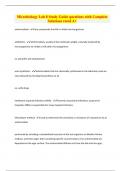
Microbiology Lab 8 Study Guide questions with Complete Solutions rated A+
Microbiology Lab 8 Study Guide questions with Complete Solutions rated A+ antimicrobials - any compounds that kill or inhibit microorganisms antibiotics - antimicrobials, usually of low molecular weight, naturally produced by microorganisms to inhibit or kill other microorganisms ex. penicillin and streptomycin semi-synthetics - antimicrobials that are chemically synthesized in the laboratory and are not produced by microbial biosynthesis at all ex. sulfa drugs healthcare acquired i...
- Exam (elaborations)
- • 8 pages •
Microbiology Lab 8 Study Guide questions with Complete Solutions rated A+ antimicrobials - any compounds that kill or inhibit microorganisms antibiotics - antimicrobials, usually of low molecular weight, naturally produced by microorganisms to inhibit or kill other microorganisms ex. penicillin and streptomycin semi-synthetics - antimicrobials that are chemically synthesized in the laboratory and are not produced by microbial biosynthesis at all ex. sulfa drugs healthcare acquired i...
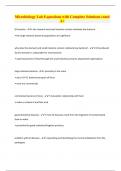
Microbiology Lab 8 questions with Complete Solutions rated A+
Microbiology Lab 8 questions with Complete Solutions rated A+ GI bacteria - • the stomach and small intestine contain relatively few bacteria • the large intestine bacterial populations are significant why does the stomach and small intestine contain relatively few bacteria? - • HCl produced by the stomach is unbearable for most bacteria • rapid movement of food through the small intestine prevents attachement (peristalsis) large intestine bacteria - • primarily in the colon ...
- Exam (elaborations)
- • 7 pages •
Microbiology Lab 8 questions with Complete Solutions rated A+ GI bacteria - • the stomach and small intestine contain relatively few bacteria • the large intestine bacterial populations are significant why does the stomach and small intestine contain relatively few bacteria? - • HCl produced by the stomach is unbearable for most bacteria • rapid movement of food through the small intestine prevents attachement (peristalsis) large intestine bacteria - • primarily in the colon ...
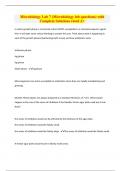
Microbiology Lab 7 (Microbiology lab questions) with Complete Solutions rated A+
Microbiology Lab 7 (Microbiology lab questions) with Complete Solutions rated A+ In which growth phase is a bacterial culture MOST susceptible to a chemotherapeutic agent? Hint: It will take some critical thinking to answer this one. Think about what is happening in each of the growth phases (bacterial growth curve) and how antibiotics work. stationary phase log phase lag phase death phase - log phase Microorganisms are most susceptible to antibiotics when they are rapidly metabolizin...
- Exam (elaborations)
- • 11 pages •
Microbiology Lab 7 (Microbiology lab questions) with Complete Solutions rated A+ In which growth phase is a bacterial culture MOST susceptible to a chemotherapeutic agent? Hint: It will take some critical thinking to answer this one. Think about what is happening in each of the growth phases (bacterial growth curve) and how antibiotics work. stationary phase log phase lag phase death phase - log phase Microorganisms are most susceptible to antibiotics when they are rapidly metabolizin...
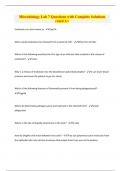
Microbiology Lab 7 Questions with Complete Solutions rated A+
Microbiology Lab 7 Questions with Complete Solutions rated A+ Endotoxins are also known as - Lipid A. When would endotoxins be released from a bacterial cell? - When the cell dies Which of the following would be the first sign of an infection that resulted in the release of endotoxin? - Fever Why is a release of endotoxin into the bloodstream potentially deadly? - It can lower blood pressure and cause the patient to go into shock. Which of the following features of Salmonella prevent ...
- Exam (elaborations)
- • 5 pages •
Microbiology Lab 7 Questions with Complete Solutions rated A+ Endotoxins are also known as - Lipid A. When would endotoxins be released from a bacterial cell? - When the cell dies Which of the following would be the first sign of an infection that resulted in the release of endotoxin? - Fever Why is a release of endotoxin into the bloodstream potentially deadly? - It can lower blood pressure and cause the patient to go into shock. Which of the following features of Salmonella prevent ...

Microbiology All Lab Exam questions with Complete Solutions rated A+
Microbiology All Lab Exam questions with Complete Solutions rated A+ True or false: The high-dry lens will be optimal for observing multicellular fungi or algae. - False True or false: The oil immersion objective is necessary to determine the morphology of prokaryotes. - True What was the largest organism you observed? The smallest? - Fungi/mold; bacteria What three shapes of bacteria did you observe? - cocci, spiral, bacilli How does increased magnification increase the field of visio...
- Exam (elaborations)
- • 18 pages •
Microbiology All Lab Exam questions with Complete Solutions rated A+ True or false: The high-dry lens will be optimal for observing multicellular fungi or algae. - False True or false: The oil immersion objective is necessary to determine the morphology of prokaryotes. - True What was the largest organism you observed? The smallest? - Fungi/mold; bacteria What three shapes of bacteria did you observe? - cocci, spiral, bacilli How does increased magnification increase the field of visio...
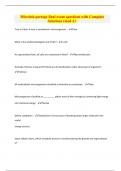
Microbio portage final exam questions with Complete Solutions rated A+
Microbio portage final exam questions with Complete Solutions rated A+ True or False: A virus is considered a microorganism. - false What is the smallest biological unit of life? - a cell At a generalized level, all cells are comprised of what? - Macromolecules Animalia, Plantae, Fungi and Protista are all classification under what type of organism? - Eukarya All multicellular microorganisms classified as Animalia are autotropic. - false Microorganisms classified as _________ obtain mos...
- Exam (elaborations)
- • 6 pages •
Microbio portage final exam questions with Complete Solutions rated A+ True or False: A virus is considered a microorganism. - false What is the smallest biological unit of life? - a cell At a generalized level, all cells are comprised of what? - Macromolecules Animalia, Plantae, Fungi and Protista are all classification under what type of organism? - Eukarya All multicellular microorganisms classified as Animalia are autotropic. - false Microorganisms classified as _________ obtain mos...
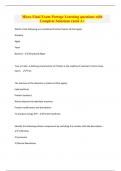
Micro Final Exam Portage Learning questions with Complete Solutions rated A+
Micro Final Exam Portage Learning questions with Complete Solutions rated A+ Which of the following are considered Protista? Select all that apply. Amoeba Algae Yeast Bacteria - Amoeba & Algae True or False: A defining characteristic of Protista is the inability of colonies to form tissue layers. - True The function of the ribosome is (select all that apply): Lipid synthesis Protein Synthesis Waste disposal via hydrolytic enzymes Protein modification and distribution To produce en...
- Exam (elaborations)
- • 8 pages •
Micro Final Exam Portage Learning questions with Complete Solutions rated A+ Which of the following are considered Protista? Select all that apply. Amoeba Algae Yeast Bacteria - Amoeba & Algae True or False: A defining characteristic of Protista is the inability of colonies to form tissue layers. - True The function of the ribosome is (select all that apply): Lipid synthesis Protein Synthesis Waste disposal via hydrolytic enzymes Protein modification and distribution To produce en...
